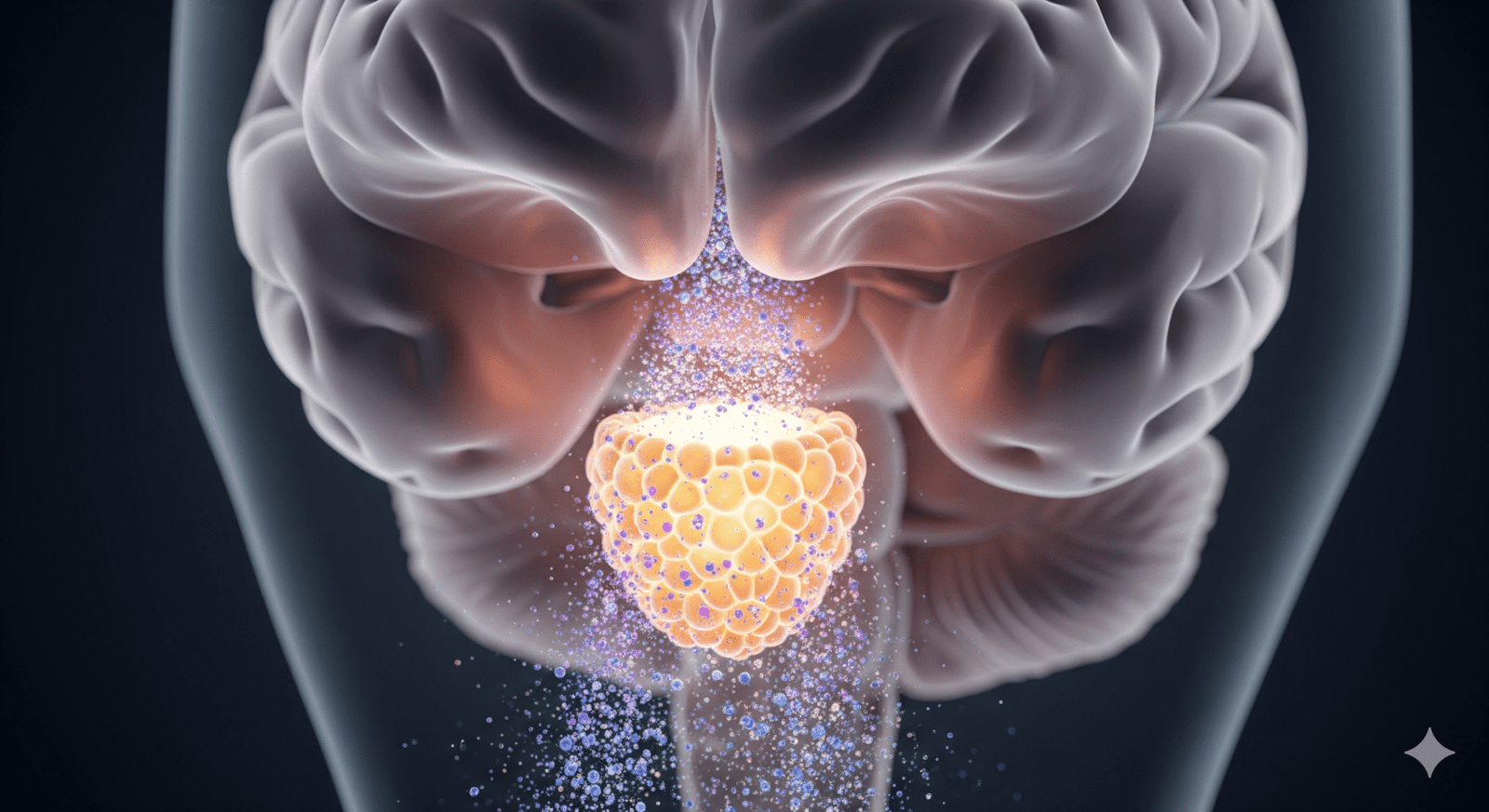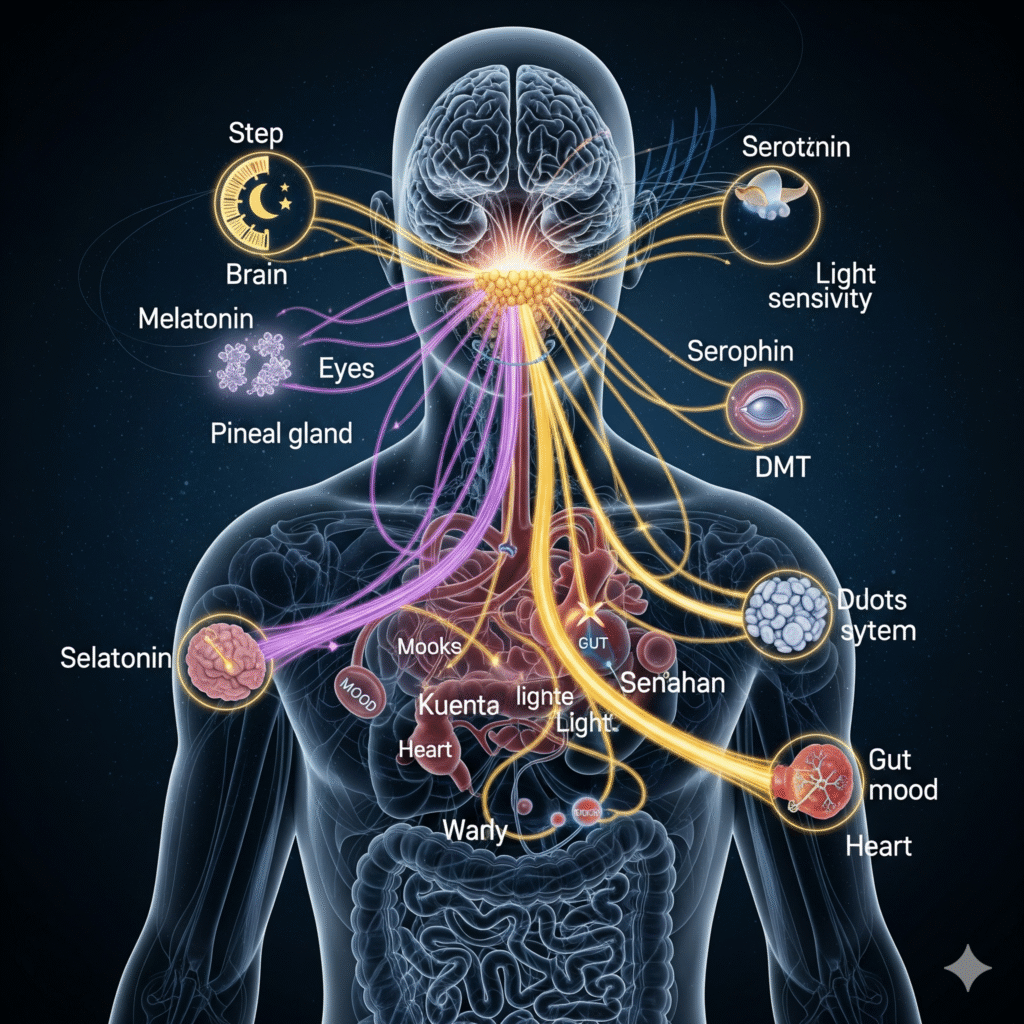Deep within the human brain lies a tiny organ that has fascinated both scientists and spiritual seekers for centuries. This small structure is called the pineal gland.

Some people refer to it as the “third eye” or even connect it with the Eye of Horus, an ancient Egyptian symbol associated with higher vision and spiritual awakening. But beyond the myths and symbolism, science shows us that this little gland has a very real and powerful role in our body.
So, what hormones does pineal gland release, and why does it matter? The answer may surprise you. Even though the function of the pineal gland goes beyond its small size, the hormones it releases affect how we sleep, how we feel, how we age, and possibly even how we experience altered states of consciousness.
In this detailed guide, we’ll explore the hormones of the pineal gland, their impact on your life, the factors that influence their production, and the connection between this gland and ancient Egyptian symbols, such as the Eye of Horus.
What Is the Pineal Gland?
The pineal gland is a tiny, pea-sized gland located deep inside the brain, right between the two hemispheres. In scientific terms, it is part of the endocrine system, the system in the body that makes and releases hormones.
- Location: near the center of the brain, between the two thalamic bodies.
- Size: about 5-8 mm in humans.
- Structure: shaped a little like a pine cone (hence the name).
Despite its small size, this gland is important. It helps regulate the body’s biological rhythms, such as when you wake up, when you feel sleepy, and even how your mood changes with the seasons.
Some ancient cultures, especially in Egypt, saw the pineal gland as a spiritual organ. The pineal gland vs Eye of Horus comparison shows striking similarities.
If you cut the brain in half and look at its structure, the pineal gland’s placement looks almost identical to the famous Egyptian third eye symbol.
The Main Hormones Released by the Pineal Gland
Now let’s get into the heart of the question: what hormones does pineal gland release?
1. Melatonin – The Sleep Hormone
The most important hormone secreted by the pineal gland is melatonin. This hormone plays a critical role in controlling the circadian rhythm-your body’s natural 24-hour clock.
- When it gets dark, the pineal gland increases melatonin production, making you sleepy.
- When it’s light, melatonin levels drop, keeping you awake and alert.
Melatonin also has antioxidant effects, helping the body fight free radicals and reduce cell damage. Some studies suggest melatonin may even slow down aspects of aging.
Fact: According to the National Center for Biotechnology Information (NCBI), melatonin levels naturally decrease with age, which is one reason older adults often struggle with sleep.
2. Serotonin – The Mood Stabilizer
Another important chemical connected to the pineal gland is serotonin. While serotonin is mainly produced in the gut, the pineal gland also synthesizes serotonin, especially as a precursor to melatonin.
- In daylight: serotonin levels are higher, boosting mood and energy.
- At night: serotonin is converted into melatonin to prepare the body for sleep.
This link shows why people with low serotonin often have both mood disorders and sleep problems. Depression, anxiety, and insomnia are often connected to serotonin-melatonin imbalances.
3. DMT (Dimethyltryptamine) – The Controversial Molecule
Some researchers suggest the pineal gland may produce small amounts of DMT, also called the “spirit molecule.” DMT is a naturally occurring psychedelic compound that creates powerful dream-like visions when consumed.
While the presence of DMT in the pineal gland is still debated, it has led many to believe this gland may be responsible for mystical experiences, dreams, and altered states of consciousness. This is where the spiritual connection to the Eye of Horus meaning spiritual comes into play.
Ancient Egyptians used the Egyptian third eye symbol to represent spiritual awakening and divine vision.
Many modern thinkers link this symbol to the pineal gland because of its possible connection with altered states and higher awareness.
How Pineal Gland Hormones Affect the Body
The hormones secreted by the pineal gland influence more than just sleep. Here’s how they shape your health and well-being:

- Regulating Sleep Cycles – Melatonin keeps your body in tune with the natural day-night rhythm. Without it, insomnia and fatigue become common.
- Mood and Emotions – The serotonin-melatonin cycle affects how happy, calm, or depressed you feel.
- Seasonal Changes – Pineal hormones help the body adapt to longer or shorter days. Seasonal affective disorder (SAD) is linked to pineal gland function.
- Anti-Aging & Healing – Melatonin is a strong antioxidant, which means it helps protect the body from cell damage.
- Spiritual Experiences – Though not proven scientifically, many link pineal activity with mystical states, dreams, and spiritual visions.
Factors That Influence Pineal Hormone Production
The pineal gland is sensitive, and many factors influence how well it works. If you wonder what hormones does pineal gland release, you must also ask what helps or harms this process.
1. Light Exposure
- Darkness boosts melatonin.
- Artificial light, especially blue light from screens, lowers melatonin levels.
- Spending time outdoors in natural light during the day helps regulate pineal function.
2. Age and Calcification
As we age, calcium deposits build up in the pineal gland-a process called pineal gland calcification. This reduces melatonin production and may affect sleep and hormone balance.
3. Stress Levels
High stress increases cortisol, which interferes with melatonin and serotonin. This creates sleep problems and mood imbalances.
4. Diet and Toxins
- Diets low in magnesium, vitamin B6, and tryptophan affect serotonin and melatonin synthesis.
- Fluoride exposure has been linked to faster pineal gland calcification.
- Alcohol, caffeine, and certain drugs disrupt pineal hormone cycles.
The Pineal Gland and Ancient Egypt
One of the most fascinating aspects of the pineal gland is its connection to ancient Egyptian symbolism. The Eye of Horus pineal gland comparison has been studied by historians, scientists, and spiritual seekers.
- The Eye of Horus spiritual meaning represents protection, health, and higher wisdom.
- The pineal gland vs Eye of Horus image shows uncanny similarity when looking at a cross-section of the human brain.
- Many believe the Egyptian pineal gland symbol suggests that ancient Egyptians knew about the spiritual power of this gland thousands of years ago.
This is why the pineal gland is often called the “third eye”. The third eye of Horus and the pineal gland both symbolize insight beyond ordinary vision.
Disorders Linked to Pineal Hormones
Since the pineal gland controls critical hormones like melatonin and serotonin, any disruption can lead to noticeable health problems. Below are some conditions tied to pineal hormone imbalance:
1. Insomnia and Sleep Disorders
The most common issue linked to pineal dysfunction is poor sleep. Low melatonin production causes insomnia, restless nights, and irregular sleep cycles. According to the CDC, about 1 in 3 adults don’t get enough sleep, and pineal gland imbalance is often a hidden factor.
2. Depression and Anxiety
Low serotonin levels, especially when not converted into melatonin properly, can result in mood disorders. This is why many people with depression also report sleep problems. Seasonal depression (SAD) is especially linked to changes in pineal gland hormone release during long winter nights.
3. Early or Delayed Puberty
The pineal gland also plays a role in sexual development. Studies suggest that pineal tumors or dysfunctions can cause puberty to begin too early (precocious puberty) or be delayed.
4. Neurodegenerative Diseases
Since melatonin is a strong antioxidant, reduced levels may worsen conditions like Alzheimer’s disease and Parkinson’s disease. Research suggests melatonin protects brain cells from damage and slows down age-related decline.
How to Support Healthy Pineal Gland Function
If you’re wondering how to keep your pineal gland healthy so it can release the right hormones, there are several lifestyle steps you can take.
1. Manage Light Exposure
- Get natural sunlight during the day to balance serotonin.
- Reduce blue light exposure from phones and laptops before bedtime.
- Sleep in complete darkness to allow natural melatonin release.
2. Improve Your Diet
The pineal gland relies on certain nutrients to produce hormones:
- Magnesium – helps convert serotonin into melatonin.
- Vitamin B6 – essential for serotonin production.
- Tryptophan – an amino acid found in turkey, eggs, nuts, and seeds that turns into serotonin.
- Omega-3s – support brain and nerve health.
3. Reduce Pineal Gland Calcification
- Drink clean water (reduce fluoride exposure).
- Limit processed foods high in chemicals.
- Add foods rich in antioxidants (berries, leafy greens, green tea) to fight calcium buildup.
4. Manage Stress
Stress increases cortisol, which interferes with melatonin. Practicing yoga, meditation, and breathing exercises helps lower stress and support healthy hormone cycles.
5. Consider Supplements
- Melatonin supplements can help with sleep disorders.
- Magnesium and B vitamins boost natural hormone production.
- Herbal remedies like ashwagandha, chamomile, and valerian root support relaxation and sleep.
Spiritual and Historical Beliefs About the Pineal Gland
The pineal gland has a deep connection not only with science but also with spirituality.
- Third Eye Symbolism: Many spiritual traditions call it the “third eye”, a center of intuition and awareness.
- Egyptian Pineal Gland Symbol: The Eye of Horus in ancient Egypt symbolized healing, wisdom, and protection. Many researchers see it as a representation of the pineal gland in the brain.
- Eye of Horus Meaning Spiritual: In Egyptian mythology, it symbolized higher consciousness and divine vision. Today, it’s still used as a sign of spiritual awakening.
- Pineal Gland vs Eye of Horus: The anatomical similarity between the brain’s pineal gland region and the Eye of Horus drawing continues to amaze researchers.
- Modern Spiritual Practices: Meditation, chanting, and breathwork are often linked to activating the pineal gland. Some people believe this leads to mystical experiences or deeper awareness.
FAQs About Pineal Gland Hormones
1. What is the main hormone secreted by the pineal gland?
The main hormone is melatonin, which controls sleep and circadian rhythms.
2. Does the pineal gland produce serotonin?
Yes, the pineal gland synthesizes serotonin, which is later converted into melatonin at night.
3. Does the pineal gland release DMT?
Some research suggests trace amounts of DMT may be produced, but this is still debated in science.
4. What happens if the pineal gland is calcified?
Calcification reduces melatonin production, leading to sleep disorders, mood imbalances, and possible aging effects.
5. Can I boost my pineal gland naturally?
Yes. Sunlight exposure, eating nutrient-rich foods, reducing toxins, managing stress, and practicing meditation can all support pineal gland health.
Conclusion
So, what hormones does pineal gland release? The answer is clear:
- Melatonin, the sleep hormone that regulates circadian rhythm and protects the body from oxidative stress.
- Serotonin, the mood stabilizer and melatonin precursor.
- Possibly DMT, the mysterious compound linked to dreams and spiritual experiences.
The pineal gland is not just a biological clock. It’s a bridge between science and spirituality, connecting our daily rhythms with ancient beliefs like the Eye of Horus spiritual meaning.
Whether you see it as an endocrine organ or the Egyptian third eye symbol, the pineal gland holds incredible power over both body and mind.
By taking care of your lifestyle, diet, and mental health, you can support this gland and keep its hormones balanced. After all, a tiny pea-sized organ deep in your brain could hold the key to better sleep, improved mood, slower aging, and maybe even a deeper sense of awareness.